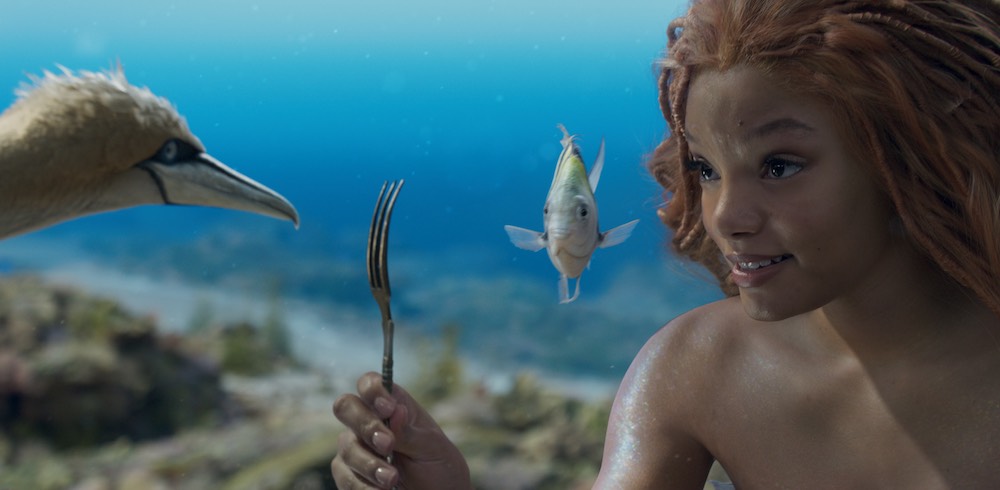The animated Disney version of the Hans Christian Anderson fairy tale is one of those movies that has eluded me, or rather, I have never gotten around to watching it. Before going into this “live-action” remake, I finally made the time to see it. While I enjoyed it for the most part, it is a lesser quality movie than the Disney films that followed it during Disney’s resurgence during the late 1980s and early 1990s (Beauty and the Beast, Aladdin, The Lion King). As with all remakes, one can only hope that the new version will deliver something better and more exciting than what was presented several years ago. The reality is that this new take on the tale is rather magical regarding its visuals.
I could not help but be mesmerized by how this movie looks. The way director Rob Marshall and his effects crew should be a tutorial for future film students on how to “shoot” and create an underwater fantasy. As for the writing and character development, there is little difference from the 1989 movie. Which again begs the question, why is Disney persisting in remaking its animated filmography through live-action versions?
I enjoyed this movie, but mainly as a curiosity piece. I cannot help but want to watch certain scenes and sequences get reimagined and also witness what they do differently. Still, The Little Mermaid (2023) doesn’t do anything that dynamically different to make it stand on its own as a unique piece of storytelling. As a technical marvel, though, it is quite a sight to behold.
For those unfamiliar with the tale, The Little Mermaid tells the story of Ariel (Halle Bailey), a young mermaid living in an undersea kingdom with her father, King Triton (Javier Bardem), and several sisters. While Ariel could live safely under her father’s and family’s protection, she is curious about the world at large, particularly that of the lives of humans who live on land. This curiosity drives her to sneak peeks at what is occurring above the water’s surface.
In doing so, she gets a glimpse into the life of Prince Eric (Jonah Hauer-King), an adventurous man who loves life at sea. When a terrible storm destroys Eric’s boat and puts his life in peril, Ariel rescues him and revives him with her beautiful singing voice. Before he awakens, Eric has Ariel’s song embedded into his mind, and the prince becomes obsessed with finding his savior. Meanwhile, the villainous octopus Ursula (Melissa McCarthy) sets her sights on the underwater kingdom and uses this new romance to launch her coup against Triton’s reign.
Rob Marshall’s version of The Little Mermaid is okay with a script by David Magee, based on the Hans Christian Anderson tale and Disney’s previous adaptation. Still, it fails to distinguish itself from Disney’s animated movie. This is a shame, considering how much work went into creating the underwater environments, which often look incredible. So, while aesthetically impressive, the movie lacks emotional depth. I cannot honestly say that the previous animated film had that going for it either, but at least it was the first, more passionate take on the story.
As far as the cast is concerned, everyone involved wanted this movie to soar high. Hailey Bailey has much love for her character and puts much heart and longing into the performance. She has a lovely singing voice and performs well in the musical numbers. Another stand-out is Melissa McCarthy, who gives a delightful, villainous turn as Ursula. I also had much fun with the performances by Daveed Diggs as Ariel’s crab friend Sebastian and Awkwafina, who voices avian friend Scuttle.
Regarding my recommendations, I mixed feelings about this movie. While it looks gorgeous on the big screen, I am reluctant to sell this adaptation as entirely worthy of full-priced tickets at the cinema. The Little Mermaid (2023) is not a bad movie at all. Still, it just doesn’t do anything dynamically different with its story and characters, which again begs the question, why is Disney spending so much time, money, and work into re-doing a movie that is fine as is?
